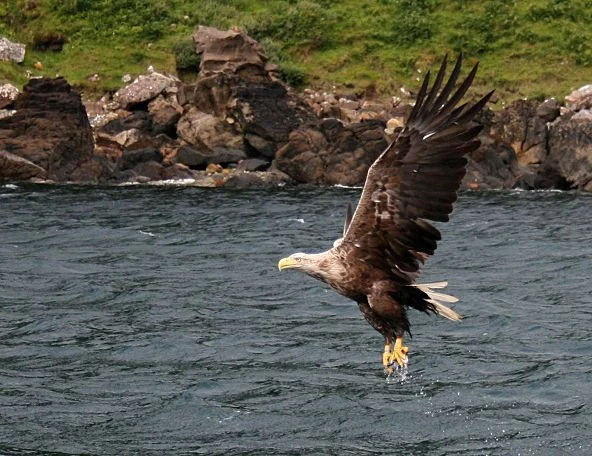EU fails to ban lead shot
15e93b3c-22db-44b4-a264-d42b01ad1400

European birds will continue to be put at risk from lead poisoning, as the European Commission announced this week that it will continue allowing the poison's use in ammunition.
Lead ammunition use will be regulated on a limited basis under the EU chemicals regulation REACH (Registration, Evaluation, Authorisation and Restriction of Chemicals), despite it being responsible for thousands of bird deaths every year.
Under REACH, the use of lead in ammunition could be banned completely through a so-called 'restriction process'. Sadly the Commission has only chosen to focus on lead in wetlands, where a ban is already supposed to have been in place for many years. By taking this course, the Commission is ignoring the evidence of damage done by lead shot in other habitats, as well as by rifle ammunition.
Lead is highly toxic to birds and people alike. A review by Oxford University found that 50,000 to 100,000 birds in Britain alone die of lead poisoning. Ducks and waders often mistake lead shot for grit (they eat small stones to aid their digestion), and die a slow and painful death from the toxic effects.
Throughout the EU there are frequent major cases of lead poisoning in raptors. An example is the poisoning of White-tailed Eagles, which eat carcasses containing lead shot and bullets every autumn. The eagles eat the carcasses of game species such as Wild Boar. Many large mammals which get shot do not die straight away, and are not found by hunters. When scavenging on the carcasses of these species, raptors often ingest fragments of lead ammunition and die of lead poisoning.
The UN Convention on Migratory Species, which the EU has signed, has called on its signatories to phase out all lead ammunition within three years. Several EU Member States, such as Denmark and The Netherlands, have already done so. Partial bans have been proven to be ineffective and unenforceable. In the UK, lead shot has been banned only in wetlands but investigations showed that as many as 70 per cent of the ducks shot in England alone still contained lead pellets.
Reacting to the Commission's announcement, Ariel Brunner of BirdLife said: “The case for a complete ban of lead ammunition in the EU is crystal clear. The Commission should protect its wildlife and citizens from poisoning and meet its obligations under the Convention on Migratory Species. Alternatives to lead ammunition such as steel shot are readily available and there is no reason to delay banning lead.”
For more information about lead poisoning click here. http://www.birdlife.org/datazone/sowb/casestudy/160
Lead ammunition use will be regulated on a limited basis under the EU chemicals regulation REACH (Registration, Evaluation, Authorisation and Restriction of Chemicals), despite it being responsible for thousands of bird deaths every year.
Under REACH, the use of lead in ammunition could be banned completely through a so-called 'restriction process'. Sadly the Commission has only chosen to focus on lead in wetlands, where a ban is already supposed to have been in place for many years. By taking this course, the Commission is ignoring the evidence of damage done by lead shot in other habitats, as well as by rifle ammunition.
Lead is highly toxic to birds and people alike. A review by Oxford University found that 50,000 to 100,000 birds in Britain alone die of lead poisoning. Ducks and waders often mistake lead shot for grit (they eat small stones to aid their digestion), and die a slow and painful death from the toxic effects.
Throughout the EU there are frequent major cases of lead poisoning in raptors. An example is the poisoning of White-tailed Eagles, which eat carcasses containing lead shot and bullets every autumn. The eagles eat the carcasses of game species such as Wild Boar. Many large mammals which get shot do not die straight away, and are not found by hunters. When scavenging on the carcasses of these species, raptors often ingest fragments of lead ammunition and die of lead poisoning.
The UN Convention on Migratory Species, which the EU has signed, has called on its signatories to phase out all lead ammunition within three years. Several EU Member States, such as Denmark and The Netherlands, have already done so. Partial bans have been proven to be ineffective and unenforceable. In the UK, lead shot has been banned only in wetlands but investigations showed that as many as 70 per cent of the ducks shot in England alone still contained lead pellets.
Reacting to the Commission's announcement, Ariel Brunner of BirdLife said: “The case for a complete ban of lead ammunition in the EU is crystal clear. The Commission should protect its wildlife and citizens from poisoning and meet its obligations under the Convention on Migratory Species. Alternatives to lead ammunition such as steel shot are readily available and there is no reason to delay banning lead.”
For more information about lead poisoning click here. http://www.birdlife.org/datazone/sowb/casestudy/160

